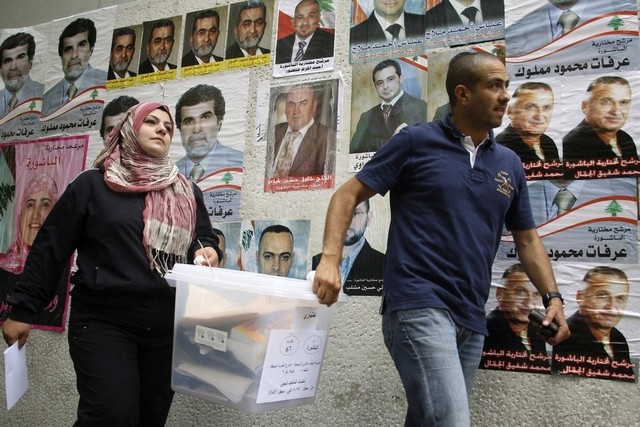Alliances reshape as Lebanon’s local polls loom
Michael Young/The National/March 30/2016
Last week, Lebanon’s interior minister Nouhad Mashnouq set the dates for municipal elections. These will take place over four weekends in May, representing the first elections since 2010, when the last local polls were conducted. Parliamentary elections have twice been postponed, and Lebanon is two years overdue for a presidential election.
While not the same barometer of national politics as parliamentary elections, municipal elections still reflect broader trends to an extent. That is why observers will be watching a number of things in the upcoming elections, even if the results are difficult to predict.
The first is how the alliance between the two major Christian political parties, the Lebanese Forces and the Free Patriotic Movement (FPM), fares. In January, Samir Geagea, the head of the Lebanese Forces, endorsed Michel Aoun, the FPM leader, for the presidency.
This dramatic reversal – Mr Geagea had long been an opponent of Mr Aoun – reshuffled the political deck in the predominantly Christian areas. This demonstration of Christian unity gained strong approval in the community, though it also worried less influential Christian parties and politicians, who felt they would be swept away by the new duopoly.
Mr Geagea’s aim in organising a rapprochement with Mr Aoun was to ensure the Lebanese Forces would gain seats in elections. In the last two parliamentary elections his party performed anaemically, because the election law gave Mr Aoun structural advantages in key voting districts. More such results, Mr Geagea feared, would have marginalised his party.
Because many Christian municipalities were divided between Lebanese Forces and Aounist supporters, the probability is that the electoral lists jointly backed by them will perform well. This, in turn, will have repercussions on the national level, bolstering Mr Aoun’s claim to be the pre-eminent Christian representative which, he will insist, entitles him to be elected president.
Another thing observers will be looking for is the fortunes of the former prime minister Saad Hariri and the lists he backs. Mr Hariri returned to Lebanon recently after a five-year absence. However, the prodigal son has not found things smooth.
During his years away, many officials within his movement began pursuing their own interests and political ambitions. Mr Hariri’s control over his bloc has been eroded, so that today he often seems to be striving to reimpose his writ on his followers. A notable sign was the recent decision of the pro-Hariri justice minister to resign, against Mr Hariri’s wishes.
Mr Hariri’s main challenge, however, is financial. His Saudi Oger contracting firm, one of the largest in Saudi Arabia, has had major cash problems, and thousands of employees have not been paid for months. This has had negative repercussions on his social institutions and media outlets in Lebanon, where salaries have also been delayed.
Deprived of an ability to finance friendly electoral lists, Mr Hariri may see his support recede. Worse, many politicians view him as vulnerable, so they may be less willing to take his preferences into consideration.
Many will be closely watching the performance of Hariri-backed lists in Beirut, Sidon and Tripoli, traditionally friendly territory for the former prime minister. The Saudis have sought to push for alliances between Lebanon’s main Sunni leaders. Mr Hariri may have to adapt by ceding ground to individuals, many of whom were politically hostile to him in the past.
An especially significant test of this strategy will come in Tripoli, where Mr Hariri must come to terms with several former rivals. They have agreed to form a coalition list of the major Sunni voting blocs, but that may be easier said than done.
Mr Hariri’s antipathy toward Najib Mikati, who replaced him as prime minister after Hizbollah unceremoniously ousted Mr Hariri in 2011, remains an obstacle. Both men would like to affirm their supremacy in Tripoli, which means more work is needed to form a unity list backed by the city’s politicians.
A third thing people will be watching is whether the public revulsion towards the political class that was visible last year will play a role in the elections. Already, in some places independent lists are being formed to oppose those supported by the major political groups. For example a “Beirut, My City” list has been announced in the capital, made up of technocrats and activists.
Such efforts may appear Quixotic. However, nowhere have the politicians seemed more exposed than at the local level, where the beefs of Lebanese are felt strongest. Poor services, political bickering and local underdevelopment have all pushed people to demand that greater power be devolved to municipalities, where politicians have relatively less sway.
The question after municipal elections will be whether Lebanon can postpone parliamentary and presidential elections further. Whatever else happens, the elections will be a healthy change from the deadlock of recent years. One only hopes they won’t be cancelled at the last minute.
Michael Young is a writer and editor in Beirut
On Twitter: @BeirutCalling























